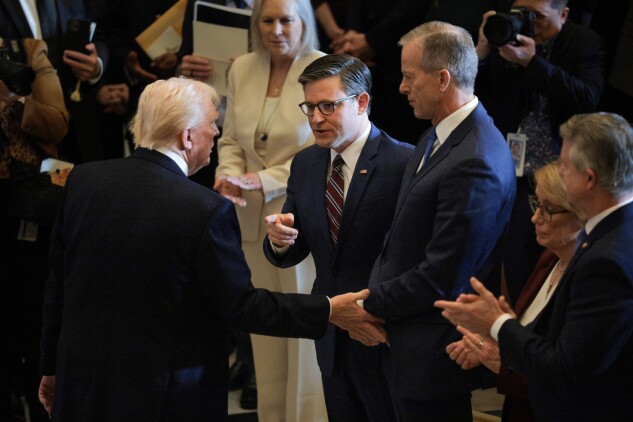- GOP’s House, Senate leaders had little relationship until now
- Tax, border goals face distinct challenges in each chamber
Congressional Republicans’ biggest goals faced a roadblock when their top two leaders called a rare joint news conference Thursday morning.
With a crucial vote looming, Senate Majority Leader John Thune (R-S.D.) and House Speaker Mike Johnson (R-La.) saw their conferences clashing over the outlines of a massive plan to cut taxes, slash spending, and boost border security, an all-eggs-in-one-basket attempt to capitalize on unified control in Washington.
Johnson and Thune spoke the language of cooperation, while saying different things.
“Our two chambers are directly aligned,” Johnson said, hoping to soothe House conservatives who doubt senators back major spending cuts. He committed to “at least” $1.5 trillion in reductions.
“We are aligned with the House,” Thune echoed.
But on details, he would only say “a lot of” senators support the lower chamber’s target and that “we’re certainly going to do everything we can to be as aggressive as possible.”
The verbal dance reflected the overriding challenge of their legislative push: both want to reach the same goal, but the GOP agenda hinges on whether they can bridge the institutional and political divides between their chambers.
Until this year, Thune and Johnson had almost no relationship, according to people who know them. They had little reason to interact until Thune won the top Senate post in January.
In many ways each man embodies the cultural differences that distinguish their chambers. Thune a near-lifer in Congress who’s spent two decades steadily climbing the ladder through a variety of political moments; Johnson rising suddenly and surprisingly, his entire House tenure defined by the Donald Trump era.
Still, people who know them describe both leaders as personally alike.
“They’re both thoughtful, faithful, and deliberate,” said Rep. Dusty Johnson (R-S.D.), Thune’s home-state colleague and a Johnson ally. Both rely on persuasion and conciliation more than hard power. “They’re both men of faith who actually live their values.”
To Johnson, their tactical divides “are actually more about the differences between the House and the Senate than about the differences between those two men.”
Small Margins
Both have little margin for error, and face potentially steep political consequences if the GOP fails to deliver.
Thune, who often still hails Ronald Reagan-style conservatism, has the more institutionally aligned chamber. Given the Senate’s longer terms, nearly two-thirds of the Senate’s 53 Republicans came to Congress before Trump’s takeover of the GOP.
Despite internal differences, Senate rules mean Thune is largely safe in his job, while the House’s procedures leave Johnson’s leadership perpetually under threat from just a sliver of critics.
“Stability is sort of the hallmark,” of the Senate, said Sen. Kevin Cramer (R-N.D.), a former House member.
In the faster-changing House, 149 out of 220 Republicans — almost 70 percent, including Johnson — were first elected in 2016 or later, when Trump became the party’s dominant force. The president holds more sway there, and its lawmakers are more comfortable with disruption.
A wider range of GOP ideology — from lawmakers representing the most conservative districts in the country to those in moderate parts of California and New York — increases the challenge, and a three-vote margin of error means every vote is a tightrope.
Thune doesn’t have a single senator from those blue states, and only one overall from a state Trump lost.
“They have different political calculations,” said House Majority Whip Tom Emmer (R-Minn.), a part of Johnson’s leadership team and a friend of Thune’s from a neighboring state.
Senators may look at the House and think, “‘Oh my gosh, it’s a zoo,’” Cramer said. “But if you’ve been in the House, you understand that the animals actually have a purpose.”
Institution vs. Disruption
Thune and Johnson’s paths to power mirror those distinctions.
Thune, a one-time Senate aide, has spent nearly all his professional life in or around the Capitol and politics. Now 64, he joined the House in 1997, the Senate in 2004. In a long rise to the top, he’s navigated changing landscapes from the presidencies of Bill Clinton, George W. Bush, and Barack Obama to the Tea Party and the tectonic realignment of the Trump era.
When he got the top Senate job in January, it was in defiance of some of Trump’s most prominent supporters, who derided him as a relic of the old guard who opposed overturning the 2020 election. While Thune has built a rapport with Trump recently, helped by muscling through even the most controversial cabinet nominees, he has criticized the president’s conduct in the past.
“He has strong institutional skills,” said former Sen. Roy Blunt (R-Mo.), who was part of the same 1997 House class as Thune. “Three decades of institutional knowledge, institutional training.”
Thune’s first major statement as Senate majority leader endorsed tradition: keeping the filibuster, the rule requiring a supermajority for most legislation.
Thune “is used to the idea,” that on most topics, “you have to negotiate with Democrats,” said Molly Reynolds, a congressional scholar at the Brookings Institution.
Johnson, 53, was first elected to the House in 2016, on the same day Trump upended the political establishment. His entire tenure has overlapped with the MAGA movement’s growing influence, which itself helped prompt the chaos that led to Johnson’s elevation in late 2023: the ouster of the party’s own speaker and refusal to accept establishment replacements. Johnson overnight transformed from little-known lawmaker to third-ranking official in the federal government.
A vocal advocate for throwing out votes in the 2020 presidential race, he’s clung tightly to Trump. When he needed help to retain the speaker’s job, or secure the final votes for stalled legislation, Trump got on the phone to close the deals.
People who know Johnson say he can agonize over tough decisions. But he’s repeatedly navigated tough votes this year, with help from Trump.
“He’s coming at it with a lot more confidence,” than in his early months as speaker, said Sen. John Curtis (R-Utah), who served in the House until this year.
Indeed, less than two hours after Johnson and Thune spoke to reporters last week, the speaker again wrangled the votes he needed, advancing the GOP plan with no room to spare, despite hard-line conservatives’ enduring distrust of the Senate.
For the moment, they kept their plans afloat, with bigger tests awaiting.
— With assistance from
To contact the reporter on this story:
To contact the editors responsible for this story:


